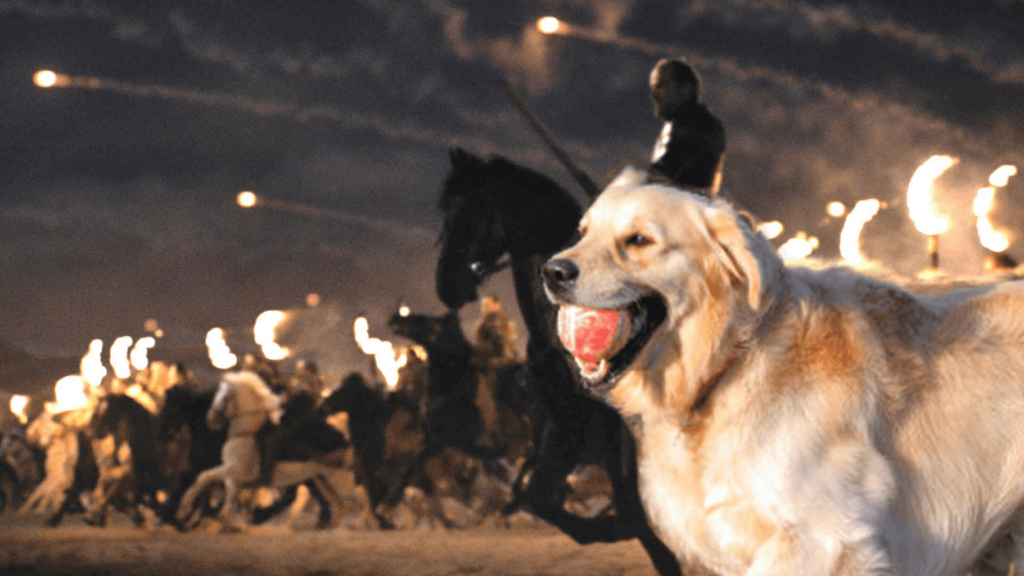This comes as a reaction to Season 8, Episode 3 of the Game of Thrones TV series, which was one of the most anticipated TV events in history. It aired on April 28th, 2019. If you haven’t seen it yet, don’t worry. (I don’t go hog wild with the spoilers, but there are some).
Yay
I stumbled upon a short video clip taken from a balcony in a sports bar, looking down on a huge crowd watching the third episode of season 8 on a movie-theater-sized screen. At the climactic moment of the episode, the crowd erupted into cheering and people hugged each other.
That’s fun.
I love when a story becomes a cultural phenomenon. And as a storyteller, I find myself wanting to study such phenomena and the stories that spark them.
Game of Thrones has made people passionate about Story. And for that, I’m happy.
And even though it’s in a different medium from the one I use to tell my stories, it has its roots in a novel. And indeed, more and more TV series are drawing from novels or short stories for their scripts. So we prose writers are not obsolete yet.
Bonus.
But
I spent the better part of episode 3 yelling at the screen for the various logical leaps and omissions and implausibilities, beginning with the silly cameo of Ghost, the dire wolf, who shows up purely for fan service, and is actually emblematic of the principle problem I see with the story.
The fact that Game of Thrones has gotten this big means that it stopped being a story exemplar. There is very little about the story I would urge writers to emulate.
Situation Over Cohesive Narrative
The main issue right now with the story is that the show runners seem to opt for memorable pieces over coherent story threads.
Writing about Season 7, Lili Loofbourow states that “Showrunners David Benioff and Daniel Weiss made no secret of the fact that they brainstormed a long time to figure out a scenario that would put the ‘Magnificent Seven’ in just enough danger. Notice that the priority isn’t characterization, or arc, or plot: What matters to them is the dramatic potential of that one scene in that one episode, and how to shove the pieces to get everyone there.”
This is the trend that continues. The story effectively jumps from one dramatic moment to the next. It’s like a series of pithy tweets or soundbites. Let’s show Ghost running with the soldiers on horseback. Let’s have a cool visual of the Dothraki army’s swords lighting on fire. Let’s have Bran warg into some ravens and fly by the Night King. Let’s have the Night King smirk at Daenerys after she lights him on fire. Let’s have Arya come out of nowhere to dispatch the most formidable opponent in the entire show.
Never mind that there’s no story purpose behind Ghost. Never mind that sending a fraction of the entire battle force out ahead toward an enemy obscured by darkness is a horrible battle plan. Never mind Bran’s warging accomplishes nothing. Never mind that up to this point, the Night King has been an emotionless, single-minded force of nature.
The optics are good.
Too Big to Make Sense
The show has had these problems for a while now. Loofbourow points to one of last season’s major problems: the implausible timeline. She explains that director Alan Taylor was fully aware that he was straining plausibility, but he just didn’t care. “If the show was struggling,” he said, “I’d be worried about those concerns, but the show seems to be doing pretty well so it’s okay to have people with those concerns.”
Loofbourow’s reply: “This is the level of sophistication at which the series is operating now: The show isn’t struggling, so it no longer has to make sense.”
And that’s why I’d urge writers not to emulate the storytelling we’re currently seeing. The size and budget and popularity of this series does not make it an exemplary story. In fact, it seems to have done the opposite; it’s made it effectively immune from justified and wise criticisms. So it can do anything it wants. And what it wants are scenes conducive to memes, basically.
Prioritize Surprise
A related problem with the writing is that the show runners value surprise too highly. The series’ biggest moments have come from game-changing shocks. Ned Stark’s beheading. Dany’s emerging from the fire. The Faceless man’s new face. The red wedding. Jon Snow being stabbed to death. Tyrion’s murder of his father. The list goes on.
In their effort to create memorable moments, the writers have shown little regard to how we arrived at those memorable moments. A big part of their strategy is to employ black boxes–off-stage occurrences that somehow lead us to the next big surprise.
The climax of Season 8’s third episode was a good example. Rather than arrive at the moment of Arya’s triumph through some clever misdirection, involving, say, a previously slain character mysteriously come back to life without blue eyes (Arya has the ability to disguise herself as anyone who has died, right?), they just push her off screen until the iconic moment during which said savior triumphs and the viewing audience cheers.
(And I’ll admit, I cheered, too. I like the choice of savior. I back it 100%. But I’m really pissed that it arose from yet another black box and that it was not cathartic and meaningful.)
I can appreciate that the show runners have a very difficult task before them, but from all appearances they seem to have lost their sense of what makes a story cohere. They push unbelievable causal chains, resort to clumsy misdirection, opt for surprise at the expense of sense, but fail to shock us in any truly emotional ways and fail to deliver on themes they’ve built in previous seasons.
Don’t care about Game of Thrones?
I’m not here to scold you for your apathy, that’s for sure. In fact, I may be talking more to writers who love it. You have to do a better job than they’re doing. You are not yet big enough to get away with failing so much.
At the very least, this cultural phenomenon gives a good reason to study up on effective storytelling. Love it, but not blindly. Because it is seriously, seriously flawed right now.
Some links:
- Check out Lili Loofbourow’s great article on Season 7, which is an education in what not to do (including some discussion of black boxes). And her article about how the writers squandered all the thematic potential of the Night King in Episode 3.
- Look at my article on Cause/Effect for more theory about why Episode 3’s climax was a problem.
- Check out my article about Theme, which you can apply to understanding why Episode 3 utterly failed to convey a coherent theme.
- Read Katherine Krueger’s accusation that the writers of Episode 3 were cowards.
- Take a look at Alyssa Rosenberg’s scathing critique of the episode.
- This article has a great list of many unanswered questions and a few pretty solid suggestions for improved payoffs.
- And here’s a wonderful article exploring the thematic failures of the episode.
- This video analysis came out after episode 4 and articulates why subverting expectations is ineffective storytelling in the particular case of GoT’s season 8.









5 Responses
Ha. It must be fun watching TV with you!
You’d have a blast watching TV with me!